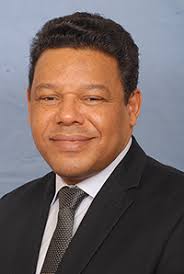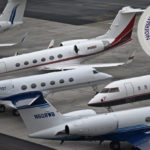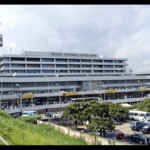
Many industry analysts in the industry agree that Nigerian airlines would fare better if they work together.
Working together means that two or more airlines may decide to fly, for example, from Lagos to Abuja with one airplane, which the passengers of the airlines put together cannot fill more than one aircraft.
It also means cutting down on the thriving cut-threat competition and rather sea one another as partners instead of as rivals.
For example, last Sunday, Dana Air operated Medview Airline aircraft from Abuja to Lagos when it could not make available its own airplane because it was waiting for the Nigerian Civil Aviation Authority inspection.
There was a time Dana Air airlifted Medview Airline passengers when the later’s aircraft were on maintenance. This relationship has been visibly good for the two airlines but there is need for all the domestic operators to partner more and take up the partnership to a higher notch.
That was the recommendation of Nigeria’s international aviation consultant, the Chief Executive Officer, African Aviation Services and President, African Business Aviation Association (ABAA), Nick Fadugba who said that such partnership is the key for survival of the domestic carriers.
Fadugba said Nigeria is the strongest market in Africa and therefore should have viable airlines.
“First of all, I am very passionate about aviation in Nigeria, I believe we are not where we should be today, given our resources. There is no market in Africa that is comparable to Nigeria. Whether you are a market lady or a board chairman, we travel; we are a nation of traders. Many foreign airlines are coming into Nigeria making good profit and yet most Nigerian airlines, to the best of my knowledge, are not making a lot of money.
In fact, some are quite poorly financially, so we need to do better. You know the international aviation industry has changed dramatically since the days of Nigerian Airways; today no airline can succeed working alone. And therefore I want to once again appeal to airlines in Nigeria to come together, to work together in operations, training and maintenance. We need to partner. Even if we don’t merge we need to partner with one another,” Fadugba said.
Fadugba remarked that the average fleet size of airlines in Nigeria is about maximum of 10 aircraft and such airlines want to compete with British Airways that has over 400 aircraft, noting that Delta Air Lines has over 500 aircraft even Ethiopian airlines has a 110 aircraft.
“So how can small airlines compete? And I am not being disrespectful, by the way; the airlines I am not talking about is fleet size, I am not talking about commitment to the industry, but I want to be realistic, because this industry is cut-throat. If you don’t have a critical mass in terms of size, in term of good management, in terms of fleet, in terms of good network, it is very hard to succeed. So we have the market in Nigeria, we are very fortunate but the fact is that our airlines are at the moment not of the size that can compete effectively against the big airlines coming into Nigeria.
Fadugba also urged the federal government to review the plan to establish a national carrier in order to stop the exploitation of foreign airlines through the Bilateral Air Service Agreement (BASA), which is largely not reciprocated by local carriers.
“I also want to appeal to the federal government of Nigeria. Over the past 15 to 20 years since the demise of Nigerian Airways, and I regret the liquidation of Nigerian airways, I did not believe it (the liquidation) was necessary. Up till today I believe it was not necessary. Kenya Airways was turned around and it was in a worse position than Nigerian Airways at the time, so we could have saved it but we didn’t. However, since Nigerian Airways was liquidated, there was no airline to reciprocate on bilateral air service agreements, so foreign airlines gained a huge advantage over Nigerian airlines,” he said.
Fadugba reiterated that the review was necessary because routes are like oil blocks, they have economic value, but until Nigeria has a strong airline, the country would not benefit from the gains of BASA.
“We need to review the setup because all airlines in Nigeria, including Air Peace are complaining that the system today is unfair, it is not in our interest. I also want to appeal to the government to support private airlines like Air Peace and many others. Of course, we want a national carrier but this should not be done to the disadvantage of private carriers like Air Peace. Air Peace is launching long haul services to Dubai but they need support from government and from the flying public in Nigeria,” Fadugba said.






